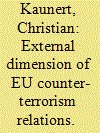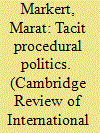| Srl | Item |
| 1 |
ID:
094864


|
|
|
|
|
| Publication |
2010.
|
| Summary/Abstract |
Some very significant policy developments indicate "supranationalisation processes" of EU external relations in counter-terrorism, even in its most significant relationship with the USA. This means that, increasingly, the USA is willing to work with Europe through its institutionalised forum-the European Union. Thus, the EU achieves certain recognition on the world stage in areas previously completely unsuspected-the "high politics" of counter-terrorism. This supranationalisation process proceeds in two stages. Firstly, the construction of an Area of Freedom, Security and Justice (AFSJ) pools a significant amount of national sovereignty at the level of the EU through the establishment of internal EU competences. As a side effect, however, it also constructs an institutionalised structure for external actors, such as the U.S., to deal with. Through dealing within this institutional setting, member states' interests become defined in such a way that increasingly they construct a "European" interest related to counter-terrorism.
|
|
|
|
|
|
|
|
|
|
|
|
|
|
|
|
| 2 |
ID:
111546


|
|
|
|
|
| Publication |
2012.
|
| Summary/Abstract |
At the closing of the 20th century, Europe decided the time was ripe to take bold steps towards the creation of a truly integrated European judicial space. Of its overall goals for the new millennium, judicial integration ranked at the top as this reflected shifting global challenges in an increasingly diversified world. After more than a decade, the reality is still that of a policy area in which multiple practices of cooperation coexist. Indeed, political and cultural factors matter in explaining how judicial decisions and practices are harmonised and integrated by EU member states. The article focuses on a number of socialisation mechanisms adopted by the EU to build mutual trust among national authorities and also looks at the European Arrest Warrant as an important test bed of the strengths and weaknesses of European judicial cooperation.
|
|
|
|
|
|
|
|
|
|
|
|
|
|
|
|
| 3 |
ID:
129581


|
|
|
|
|
| Publication |
2014.
|
| Summary/Abstract |
This article analyses the dynamics of procedural politics in the EU's Police and Judicial Cooperation in Criminal Matters across subsequent Treaty regimes (Amsterdam and Lisbon). In the course of legislative policy-making in this area, member states and the European Commission engage in strategic interactions with respect to procedural rules, whereby specifically member states attempt to contain integrationist legislation coming from the Commission through legislative preemption strategies. Drawing on Joseph Jupille's procedural politics approach, the article hypothesizes that member states' strategies are conditioned by several scope conditions, notably jurisdictional ambiguity, influence difference between different decision-making procedures, and prointegrationist case law from the European Court of Justice. I test these hypotheses by analysing the legislative process on a number of selected cases.
|
|
|
|
|
|
|
|
|
|
|
|
|
|
|
|